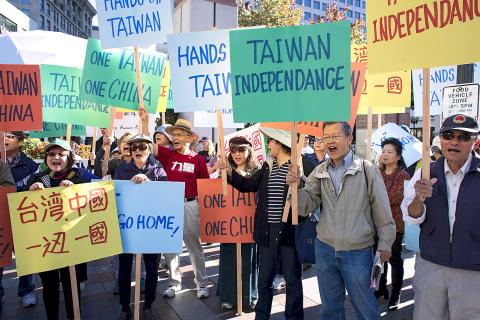US officials are reassuring Taiwan that no matter what Chinese President Xi Jinping (習近平) says about it during his summit with US President Barack Obama this week, Washington will not change its current policies.
“It is normal for a Chinese leader to raise Taiwan,” US Assistant Secretary of State for East Asia and Pacific Affairs Daniel Russel told a media briefing on Tuesday.
“We will always make clear when the issue arises that we place great importance on stability across the [Taiwan] Strait,” he said. “We respect the right of the people on Taiwan to exercise their democratic rights and will continue to counsel restraint on the part of Beijing in order to maintain trust and stability.”

Photo: Reuters
Speaking at the same event, Daniel Kritenbrink, senior director for Asian affairs at the US National Security Council, said that the US respected Taiwan’s democratic process and had a long-standing position on cross-strait issues based on the “one China” policy, the six communiques and the Taiwan Relations Act (TRA).
“Our fundamental interest is in cross-strait stability,” he said.
Russel said that the US had an immensely complex relationship with China, one that was anchored in a commitment to prevent strategic rivalry and to ensure “we are working to reconcile our respective legitimate interests.”
“We are digging down on problem areas. That will be a significant dimension of the summit. We do not paper over our differences with China on important issues,” he said. “We have serious differences over what constitutes acceptable behavior in cyberspace and in maritime space — particularly in the South China Sea.”
He said there were also differences on human rights and the treatment of civil society, as well as financial and regulatory policy. Russel said that the US was not trying to contain China and that US policy was not hostile.
“The same rights that apply to the big and strong apply similarly to the small and weak. Freedom of navigation and freedom of over-flight are not rights that one country grants to another,” he said.
“Strong and important countries like China have to ensure that small neighbors have the ability to exercise those same rights,” he said.
Xi arrived in Seattle on Tuesday and is to meet with Obama at the White House later today and tomorrow.
As Xi arrived, the New York Times said that the US and China had been negotiating what could become the first arms control accord for cyberspace with a goal of announcing an agreement during Xi’s visit.
According to the newspaper, the deal would safeguard critical infrastructure during peacetime, but was not expected to cover contentious issues such as the theft of intellectual property or data.
An article by Bloomberg predicted that Xi’s visit would be overshadowed by China’s growing military assertiveness, its expanding economic espionage and its crackdown on human rights at home.
“We have to be cognizant the level of anxiety, competition and tension in our relationship is here to stay,” former US Department of State official Kurt Campbell was quoted as saying by Bloomberg.

The Taiwanese passport ranked 33rd in a global listing of passports by convenience this month, rising three places from last month’s ranking, but matching its position in January last year. The Henley Passport Index, an international ranking of passports by the number of designations its holder can travel to without a visa, showed that the Taiwan passport enables holders to travel to 139 countries and territories without a visa. Singapore’s passport was ranked the most powerful with visa-free access to 192 destinations out of 227, according to the index published on Tuesday by UK-based migration investment consultancy firm Henley and Partners. Japan’s and

NATIONAL SECURITY THREAT: An official said that Guan Guan’s comments had gone beyond the threshold of free speech, as she advocated for the destruction of the ROC China-born media influencer Guan Guan’s (關關) residency permit has been revoked for repeatedly posting pro-China content that threatens national security, the National Immigration Agency said yesterday. Guan Guan has said many controversial things in her videos posted to Douyin (抖音), including “the red flag will soon be painted all over Taiwan” and “Taiwan is an inseparable part of China,” while expressing hope for expedited “reunification.” The agency received multiple reports alleging that Guan Guan had advocated for armed reunification last year. After investigating, the agency last month issued a notice requiring her to appear and account for her actions. Guan Guan appeared as required,

Japan and the Philippines yesterday signed a defense pact that would allow the tax-free provision of ammunition, fuel, food and other necessities when their forces stage joint training to boost deterrence against China’s growing aggression in the region and to bolster their preparation for natural disasters. Japan has faced increasing political, trade and security tensions with China, which was angered by Japanese Prime Minister Sanae Takaichi’s remark that a Chinese attack on Taiwan would be a survival-threatening situation for Japan, triggering a military response. Japan and the Philippines have also had separate territorial conflicts with Beijing in the East and South China

A strong cold air mass is expected to arrive tonight, bringing a change in weather and a drop in temperature, the Central Weather Administration (CWA) said. The coldest time would be early on Thursday morning, with temperatures in some areas dipping as low as 8°C, it said. Daytime highs yesterday were 22°C to 24°C in northern and eastern Taiwan, and about 25°C to 28°C in the central and southern regions, it said. However, nighttime lows would dip to about 15°C to 16°C in central and northern Taiwan as well as the northeast, and 17°C to 19°C elsewhere, it said. Tropical Storm Nokaen, currently